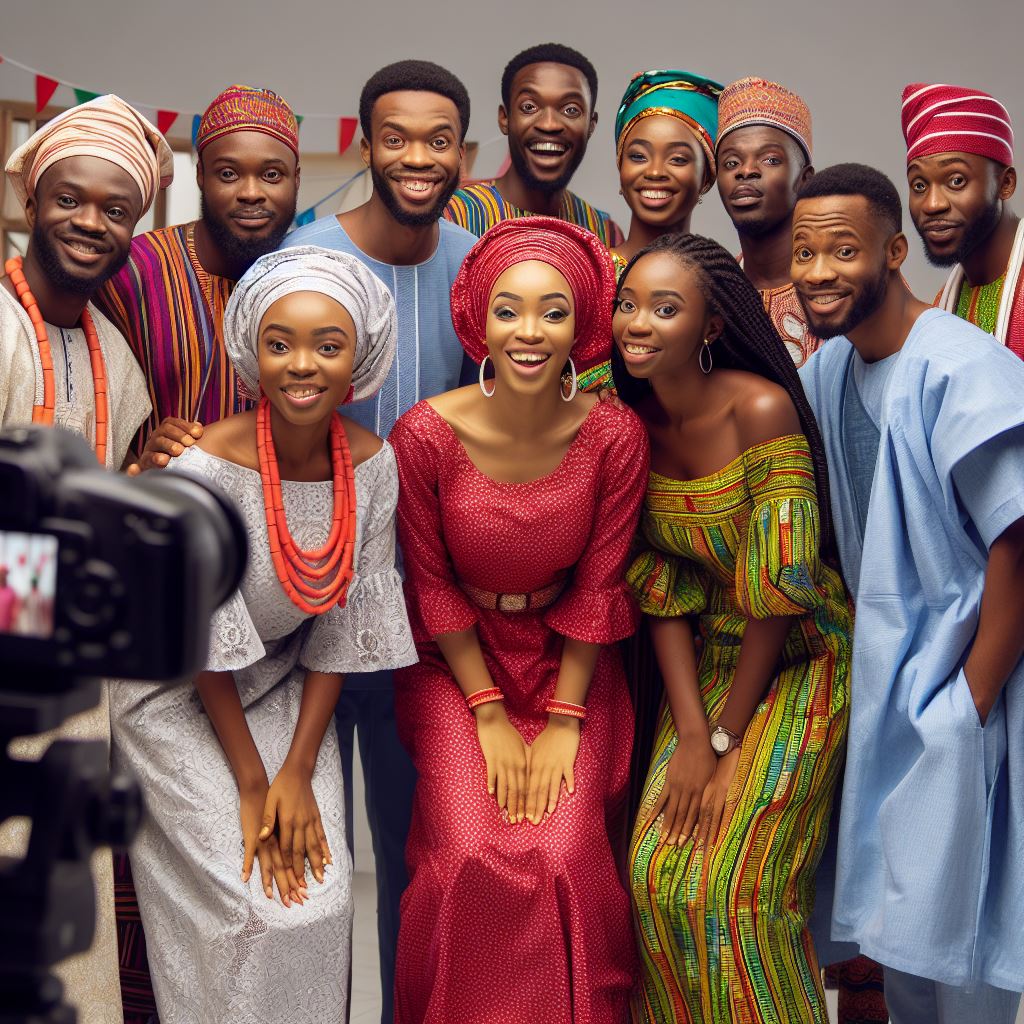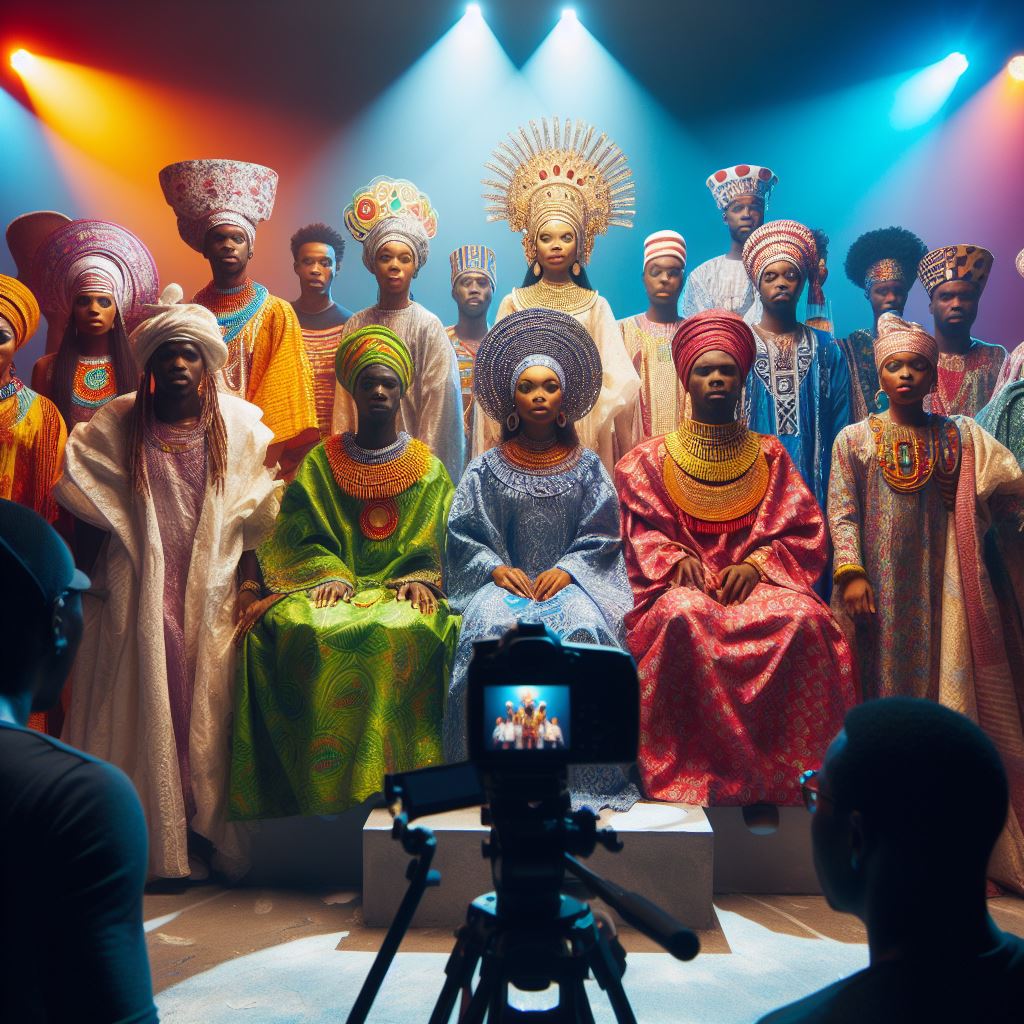Introduction
Directors play a crucial role in Nigerian film production, shaping the outcome of each film.
Their vision, creativity, and leadership guide the entire production process, from script to screen.
In recent years, the Nigerian film industry, also known as Nollywood, has experienced significant growth.
This growth has led to international recognition and accolades for Nigerian filmmakers and actors.
Directors in Nigeria have the challenge of capturing the essence of Nigerian culture and storytelling.
They are tasked with bringing authentic and relatable stories to life on screen.
Through their direction, they can convey the richness and diversity of Nigerian narratives.
From selecting the cast to overseeing post-production, directors are involved in every aspect of filmmaking.
Their expertise and guidance are essential in creating high-quality and engaging films that resonate with audiences.
Overall, directors play a pivotal role in the success and impact of Nigerian films both locally and globally.
Responsibilities of Directors in Nigerian Film Production
- Directors oversee the creative and technical aspects of film production.
- They guide the vision of the film and ensure its successful execution.
- Effective communication and leadership skills are crucial in directing a film.
Primary Responsibilities of Directors
- Directors are responsible for interpreting the script and bringing it to life on screen.
- They collaborate with the screenwriter, actors, and crew to achieve the desired outcome.
- Directors make decisions on the overall look, feel, and style of the film.
The Crucial Role of Directors in Guiding the Vision of the Film
- Directors shape the narrative and emotional tone of the film through their direction.
- They work closely with the cinematographer to capture the desired visual aesthetics.
- Directors ensure that the performances of the actors align with the film’s vision.
Importance of Effective Communication and Leadership Skills
- Directors must effectively communicate their vision to the cast and crew.
- They inspire and motivate the team to give their best performances and efforts.
- Strong leadership skills are essential in managing and coordinating a film production.
Overall, the role of directors in Nigerian film production is pivotal. They are responsible for overseeing all aspects of the filmmaking process, from script interpretation to post-production.
Effective communication and leadership skills are vital in ensuring the success of a film. By guiding the vision of the film and collaborating with the team, directors play a crucial role in bringing stories to life on the silver screen.
Read: Impact of Communication Arts on Nigerian Media
Influence on Creative Direction
Directors play a pivotal role in shaping the creative direction of Nigerian films. They infuse their unique vision into every aspect of the production, from storytelling to visual aesthetics.
Collaboration with Screenwriters
Directors collaborate closely with screenwriters to ensure that the screenplay aligns with their creative vision. They provide valuable insights and feedback to enhance the narrative structure and character development.
Example: Kunle Afolayan
Renowned director Kunle Afolayan is known for his distinct storytelling style and attention to detail. In films like “The Figurine” and “October 1,” he seamlessly blends cultural elements with contemporary storytelling, captivating audiences worldwide.
Collaboration with Cinematographers
Directors work hand in hand with cinematographers to achieve the desired visual aesthetics. Through careful shot selection and framing, they enhance the mood and atmosphere of each scene, elevating the overall cinematic experience.
Example: Kemi Adetiba
Kemi Adetiba is celebrated for her exceptional cinematography skills. In “The Wedding Party” series, she creates visually stunning compositions that capture the essence of Nigerian culture while maintaining a modern flair, earning critical acclaim both domestically and internationally.
Collaboration with Other Crew Members
Directors orchestrate the efforts of various crew members, including production designers, costume designers, and editors, to bring their vision to life.
By fostering a collaborative environment, they ensure that every element contributes to the film’s overall aesthetic and narrative coherence.
Example: Tunde Kelani
Tunde Kelani’s meticulous attention to detail is evident in films like “Saworoide” and “Maami.” His collaboration with talented crew members results in visually striking films that resonate with audiences on a profound level, earning him accolades and admiration within the industry.
Impact on the Industry
Through their innovative storytelling techniques and artistic vision, Nigerian directors are reshaping the landscape of African cinema.
Their contributions not only entertain but also challenge societal norms and provoke meaningful discussions about culture, identity, and human experiences.
Essentially, directors wield significant influence over the creative direction of Nigerian film production.
Through collaboration with screenwriters, cinematographers, and other crew members, they bring scripts to life, infusing each project with their unique artistic vision.
Renowned directors like Kunle Afolayan, Kemi Adetiba, and Tunde Kelani continue to push boundaries and inspire future generations of filmmakers, cementing their legacy in the vibrant tapestry of Nigerian cinema.
Read: Internship Opportunities for Communication Arts Students
Collaborations with Actors and Crew Members
Directors in Nigerian film production play a pivotal role in shaping performances. They meticulously guide actors to convey emotions authentically.
By providing constructive feedback, directors assist actors in refining their performances. This ensures that each scene resonates with the audience.
Understanding the nuances of character portrayal, directors help actors delve deeper into their roles. They encourage experimentation, fostering creativity on set.
Incorporating cultural insights, directors help actors embody authentic Nigerian identities. This adds depth and relatability to the characters portrayed.
Fostering a Collaborative Environment
Creating a collaborative atmosphere on set is imperative for successful film production. Directors set the tone by encouraging open communication.
They value input from cast and crew, recognizing the diverse perspectives they bring. This inclusivity fosters a sense of ownership and commitment.
By fostering trust and respect, directors empower team members to contribute their best ideas. This collective effort leads to innovative solutions.
Emphasizing teamwork over individual accolades, directors promote a unified vision for the project. This cohesion ensures seamless execution of the directorial vision.
Inspiring and Motivating the Team
Directors serve as the driving force behind the project, inspiring and motivating the team. They articulate their vision with passion and clarity.
Through effective leadership, directors instill confidence in their team’s abilities. This confidence encourages creativity and risk-taking.
Acknowledging and celebrating achievements, directors boost morale and enthusiasm among the crew. This fosters a positive work environment conducive to productivity.
Leading by example, directors demonstrate dedication and professionalism, inspiring the team to emulate their commitment. This sets a high standard for excellence on set.
Basically, directors in Nigerian film production are instrumental in facilitating collaborations with actors and crew members.
By fostering a collaborative environment and inspiring the team, they ensure the delivery of compelling performances and the achievement of the desired outcome.
Read: Exploring Semiotics in Communication Arts

Technical Expertise and Visual Aesthetics
When it comes to film production, the technical aspects play a significant role in the final outcome. Directors are responsible for overseeing various technical elements such as camera work, lighting, and sound design to ensure that everything is executed properly.
Camera work is essential in capturing the right angles, framing the shots correctly, and creating visual storytelling that enhances the overall narrative of the film.
Directors work closely with cinematographers to achieve the desired visual style and aesthetic that suits the story being told.
Lighting is another critical aspect that directors have a hand in. Proper lighting can set the mood, create atmosphere, and highlight key elements within a scene.
Directors work with lighting technicians to achieve the right balance of light and shadow to convey the emotions and tone of the film effectively.
Sound design is often an overlooked but vital component in film production. Directors collaborate with sound engineers to ensure that the audio elements complement the visuals and enhance the overall viewing experience.
From dialogue clarity to ambient sounds and music, directors oversee every detail to create a seamless auditory experience for the audience.
Transform Your Career with Expert Guidance
Get personalized mentorship consulting that’s tailored to your unique path. Our expert advice is actionable and exclusive.
Get StartedImportance of directors with a strong technical background in achieving high-quality results
It is essential for directors to have a strong technical background to effectively communicate with the crew and bring their creative vision to life.
Understanding the technical aspects of film production allows directors to make informed decisions, solve problems efficiently, and ensure that the final product meets their artistic standards.
Moreover, the visual aesthetics of a film play a crucial role in conveying the intended mood and tone to the audience.
Directors have the creative vision to conceptualize how the film should look and feel, and it is their responsibility to ensure that the visual elements align with the overall narrative and thematic elements of the story.
By paying attention to details such as color palette, set design, costumes, and visual effects, directors enhance the storytelling experience and evoke specific emotions from the audience.
Visual aesthetics can create a sense of realism, fantasy, suspense, or drama, depending on the director’s artistic choices and vision for the film.
In general, the role of directors in Nigerian film production goes beyond storytelling; they are also responsible for overseeing the technical aspects and visual aesthetics of the film.
Directors with a strong technical background can achieve high-quality results by managing camera work, lighting, sound design, and ensuring that the visual elements align with the intended mood and tone of the film.
Budgeting and Resource Management
Directors in Nigerian film production play a pivotal role in managing budgets and resources effectively. They oversee financial aspects, ensuring efficient allocation throughout the production process.
A director’s primary responsibility includes overseeing the financial aspects of film production. They must manage budgets, ensuring resources are allocated wisely to achieve the desired creative vision.
Directors meticulously plan and allocate funds across various aspects of production, from casting to post-production. They prioritize expenditures, ensuring essential elements receive adequate funding.
Creative Decision Making
Directors face the challenge of making creative decisions within budgetary constraints. They must innovate and find cost-effective solutions to bring their artistic vision to life.
Resource Allocation
Directors allocate resources judiciously, balancing the needs of the project with financial limitations. They prioritize essential elements while seeking innovative ways to stretch resources further.
Challenges Faced
Balancing artistic vision with financial considerations presents significant challenges for directors. They must navigate budgetary constraints without compromising the quality and integrity of the film.
Artistic Vision vs. Financial Considerations
Directors strive to maintain the integrity of their artistic vision while adhering to financial constraints. They explore creative solutions to achieve desired outcomes within budgetary limitations.
Directors implement strategies to maximize resources, ensuring every aspect of production contributes to the overall vision. They streamline processes and optimize resource utilization to minimize wastage.
Collaborative Approach
Directors collaborate with producers, cinematographers, and other key stakeholders to optimize resource allocation. They leverage collective expertise to find innovative solutions that align with budgetary constraints.
Adaptability and Flexibility
Directors must remain adaptable and flexible, adjusting their approach to accommodate shifting budgetary requirements. They embrace challenges as opportunities for creative problem-solving, finding innovative ways to overcome financial limitations.
In short, In Nigerian film production, directors play a crucial role in managing budgets and resources.
Despite the challenges posed by budgetary constraints, directors demonstrate ingenuity and resourcefulness in achieving their artistic vision while staying within financial limitations.
Through efficient resource management and creative decision-making, they ensure that every aspect of the production contributes to the success of the film.
Read: Developing Critical Thinking in Language Arts
Cultural Representation Through the Director’s Lens
Directors wield immense power in showcasing Nigerian culture authentically. They meticulously craft scenes to reflect diverse traditions, languages, and customs.
By collaborating with local talent and cultural experts, directors ensure authenticity in every frame.
Social Commentary and Advocacy: A Director’s Responsibility
Directors serve as catalysts for social change by addressing pertinent issues through their films. They use storytelling as a tool to spark conversations on topics such as gender equality, political corruption, and socioeconomic disparities.
Through compelling narratives and thought-provoking visuals, directors provoke introspection and inspire action.
Nollywood’s Impact on Global Perceptions
Nigerian films have transcended borders, captivating audiences worldwide with their unique storytelling and vibrant cultural representations. Directors play a pivotal role in shaping how Nigeria is perceived on the global stage. Through their films, they challenge stereotypes and showcase the richness and diversity of Nigerian society.
Authenticity in Cultural Representation
Directors prioritize authenticity in their portrayal of Nigerian culture, steering clear of clichés and stereotypes.
They delve deep into the intricacies of local traditions, capturing the nuances that make Nigerian culture distinct. By showcasing diverse perspectives, directors celebrate the richness of Nigeria’s cultural tapestry.
Driving Social Change Through Cinema
Directors leverage the power of cinema to address pressing social issues, sparking conversations and igniting change. They fearlessly tackle taboo topics, challenging societal norms and advocating for marginalized communities.
Through their films, directors amplify voices that are often unheard, shedding light on injustices and advocating for a more equitable society.
Influence on Global Audiences
Nigerian films have a profound impact on global audiences, offering unique insights into Nigerian society and culture.
Directors play a crucial role in shaping these perceptions, crafting narratives that resonate with audiences worldwide. Through their films, they bridge cultural divides, fostering empathy and understanding across borders.
In a nutshell, Directors hold immense power in shaping cultural narratives and driving social change through their films.
By authentically representing Nigerian culture, addressing pressing social issues, and influencing global perceptions, directors play a pivotal role in shaping the future of Nigerian cinema and society as a whole.
This section explores how directors in Nigerian film production contribute to cultural representation, social commentary, and global influence, highlighting their pivotal role in shaping narratives and driving change.
Read: Student Experiences: Life in Communication Arts
Industry Recognition and Awards
Industry recognition, including film festivals and awards, holds immense significance for Nigerian directors. These platforms serve as gateways to global visibility and validation.
Through such acknowledgments, Nigerian filmmakers not only gain credibility but also attract investment and collaborations.
Global Acclaim and Achievement
Nigerian directors have increasingly garnered international accolades, showcasing the depth and diversity of talent within the industry.
From Cannes to the Oscars, Nigerian films have left indelible marks, proving their ability to captivate audiences worldwide.
Directors like Kunle Afolayan, Niyi Akinmolayan, and Genevieve Nnaji have earned respect and admiration on the global stage, reinforcing Nigeria’s position as a hub of cinematic excellence.
Elevating Nigerian Cinema
The recognition received by Nigerian directors on the global stage serves as a catalyst for the elevation of Nigerian cinema.
It dispels stereotypes and misconceptions, showcasing the rich storytelling traditions and technical prowess prevalent in Nigerian filmmaking.
Moreover, it opens doors for collaborations with international filmmakers, fostering cultural exchange and mutual learning.
Fostering Cultural Exchange
Industry recognition fosters cultural exchange, allowing Nigerian directors to share their narratives with a broader audience.
Through film festivals and awards, they transcend geographical boundaries, offering glimpses into the rich tapestry of Nigerian culture.
This exchange not only enriches the global cinematic landscape but also fosters greater understanding and appreciation of Nigerian heritage.
Attracting Investment
The acclaim garnered by Nigerian directors attracts investment into the local film industry. International recognition validates the commercial viability of Nigerian films, enticing investors seeking profitable ventures.
This influx of capital fuels the growth of the industry, enabling directors to realize ambitious projects and explore new creative frontiers.
Empowering Emerging Talent
Industry recognition serves as a source of inspiration and empowerment for emerging Nigerian directors. Seeing their counterparts receive prestigious awards motivates them to strive for excellence and push the boundaries of their craft.
It instills a sense of pride and belonging within the Nigerian filmmaking community, nurturing a new generation of visionary directors.
Shaping Global Perceptions
The success of Nigerian directors in international arenas reshapes global perceptions of African cinema. It challenges stereotypes and preconceived notions, presenting Nigerian films as vibrant, relevant, and culturally significant.
By showcasing diverse narratives and perspectives, Nigerian directors contribute to a more nuanced understanding of African identity on the global stage.
In fact, industry recognition and awards play a pivotal role in shaping the trajectory of Nigerian film production.
They not only validate the talent and creativity of Nigerian directors but also elevate the profile of Nigerian cinema on a global scale.
Through international acclaim, Nigerian filmmakers transcend borders, fostering cultural exchange, attracting investment, and reshaping global perceptions of African cinema.
Conclusion
Essential Contributions of Directors
Directors are the visionary leaders behind Nigerian film productions, steering the creative process with finesse.
They wield immense influence, shaping narratives, and characters, imbuing each scene with cultural richness and authenticity.
Visionary Leadership
In the dynamic landscape of Nigerian cinema, directors stand as the guiding force, driving innovation and excellence.
Their keen artistic sensibilities breathe life into scripts, transforming words into captivating visual experiences.
Navigating Challenges
Amidst budget constraints and logistical hurdles, directors display remarkable resilience, finding ingenious solutions to propel projects forward.
Their ability to adapt and improvise fuels the ingenuity that defines Nigerian filmmaking.
Cultural Stewards
Directors serve as custodians of Nigerian heritage, infusing films with cultural nuances and storytelling traditions passed down through generations.
Their commitment to authenticity fosters a deeper connection between audiences and the narratives portrayed on screen.
Collaborative Mastery
In collaboration with talented crews and casts, directors orchestrate harmonious collaborations, harnessing the collective creativity to craft cinematic masterpieces.
Their leadership fosters an environment where every contributor’s voice is heard and valued, resulting in cohesive storytelling.
Driving Industry Growth
The success of Nigerian cinema on the global stage owes much to the vision and expertise of its directors.
Their relentless pursuit of excellence elevates the industry, attracting international acclaim and investment.
Embracing Diversity
Directors champion diversity, amplifying underrepresented voices and perspectives in Nigerian filmmaking.
Their inclusive approach enriches storytelling, reflecting the vibrant tapestry of Nigerian society.
Encouraging Exploration
As audiences worldwide continue to discover the richness of Nigerian cinema, there’s a growing appreciation for the talents of its directors.
Their unique storytelling prowess captivates hearts and minds, inviting viewers to delve deeper into the cinematic treasures of Nigeria.
In closing, directors play a pivotal role in shaping the identity and trajectory of Nigerian cinema.
Their unwavering dedication, creative vision, and cultural stewardship are indispensable assets driving the industry’s success and growth.
As we celebrate the achievements of Nigerian directors, let us also acknowledge the collective effort behind each cinematic triumph and embrace the opportunity to further explore and appreciate the diverse narratives that define Nigerian cinema.




